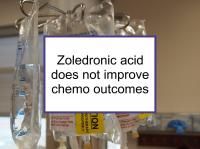A new study has reported that the addition of the bisphosphonate zoledronic acid to chemotherapy in breast cancer patients does not appear to enhance the anti-tumor effects of chemotherapy. Bisphosphonates are drugs used to treat osteoporosis and metastatic bone disease (Fosamax, Boniva and Actonel are all bisphosphonates).
Previous studies have demonstrated synergistic anti-tumor effects of chemotherapy and zoledronic acid. In the study (entitled the ANZAC study), 40 breast cancer patients were assigned to receive either a single 4mg infusion of zoledronic acid 24 hours after the first cycle of FE100C (5-fluorouracil, epirubicin, and cyclophosphamide) chemotherapy or chemotherapy alone.
The two groups were matched according to tumor stage, estrogen receptor (ER), HER2 status and menopausal status to minimize biological differences in the two treatment groups that could influence chemosensitivity. Baseline clinical and pathological characteristics were comparable between the two groups of 20 women. All of the participants had repeat breast core biopsies at Day 5 and/or Day 21.
Measures of cell death (apoptotic index) and proliferation were taken on core biopsy specimens. Serum vascular endothelial growth factor (VEGF), which stimulates angiogenesis, was also measured at baseline before the beginning of chemotherapy and on Day 5 and Day 21. Percentage change from baseline to Day 5 and from baseline to Day 21 for the different biological end-points (including apoptosis, proliferation and angiogenesis) were assessed.
At Day 5, a greater reduction in serum VEGF was found in patients treated with chemotherapy plus zoledronic acid compared to chemotherapy alone, but these effects were lost by Day 21. Cell turnover index (a measure of increased apoptosis and reduced proliferation) fell at Day 5 in both groups but recovered much more rapidly in those treated with chemotherapy plus zoledronic acid than chemotherapy alone by Day 21.
The authors conclude that they found no definite evidence of a direct anti-tumor effect of the addition of zoledronic acid to chemotherapy, but potentially relevant biological effects were seen in this small study. The clinical relevance of recovery of cell turnover by Day 21 with chemotherapy plus zoledronic acid is unclear. Studies with more frequent dosing of zoledronic acid are warranted to exploit any potential anti-angiogenic effect of zoledronic acid.
Comments regarding the study
While carefully designed, this study was too small to provide a definitive answer as to whether adding zoledronic acid to chemotherapy in breast cancer patients could improve outcomes. As the authors indicate, some of the findings are suggestive and deserve further study.
